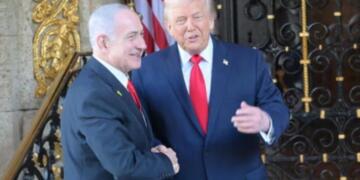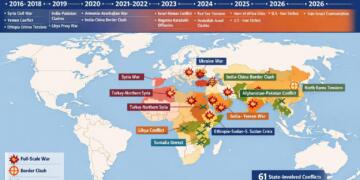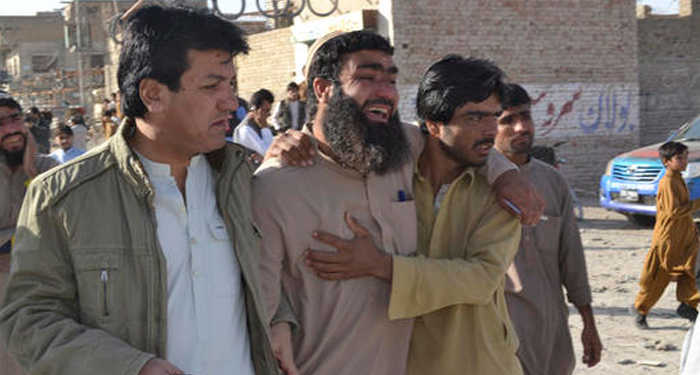A police training academy in Quetta, the capital town of the Balochistan Province of Pakistan, was attacked by ‘terrorists’ on Monday late night. 61 cadets were killed and 117 injured. Three well trained terrorists entered through the main gate by killing the guards. They carried Kalashnikovs and threw grenades. Two of them blew themselves up at the hostel, while the third was shot down before he could. ISIS (the Islamic State) claimed the responsibility of the attack within few hours through its Amaq media wing, but the officials are blaming it on the LeJ (Lashkar-e-Jhangvi) group of terrorists who are known for killing Shia Muslims in the Province. It is not the first time when more than one terrorist organization had claimed its responsibility. Motives behind this attack is unclear but Quetta being a stronghold for the Shia community, the Sunni extremist organizations might have a simple agenda of sending terror waves.
Quetta is located quite close to the Afghanistan border. It was previously attacked in August when 73 people were killed in a suicide bomb blast at a hospital, where a prominent lawyer of the Province was admitted after being shot and lawyers all over the town had gathered to see him.
In January this year, LeJ blew a bus full of Shia pilgrims, killing 20 people. Monday’s blasts are being considered as one of the most devastating attacks, after the one at Peshawar, where 140 people, mostly children, were killed.
Terror attacks have become very common in Pakistan, and it’s not a new thing. But after two attacks at Quetta, the capital of Balochistan within two months, it is time we pondered where Pakistan really went wrong. When Pakistan was founded, Muhammad Ali Jinnah, the Qaid-e-Azam of Pakistan, stated that the people of every cast, creed and religion will have an equal status in the country, even though it will be a Muslim majority country. Jinnah was a Shia Muslim himself and he nominated several Shias, an Ahmadi and a Hindu to the first cabinet. However, the first wave of Islamic radicalization in Pakistan started with the declaration of its official name, which is the Islamic Republic of Pakistan, making it a non-secular country, back in 1949 itself.
At the time of partition in 1947, an estimated 23 percent (one-fourth) population of Pakistan was non-Muslim. But currently, the population has fallen down to 3 percent. Murdered, converted and migrated, the minorities couldn’t survive in a country which couldn’t keep them safe. All of this did not happen in a day. The idea, the foundation on which Pakistan was made: a separate land for the Muslims, is the reason why Pakistan is religiously intolerant and full of Islamic extremists. The Muslims in India are in a much better condition. They do not have to see suicide attacks or their children killed. There were several decisive situations in the history which has reduced it to a country facing bomb blasts every month, which includes the ideas and actions of General Zia during the 1980s and enabling terrorists to fight proxy wars with India. With the spread of fundamentalism, every group tried to force its interpretation of Islam on others, creating a variety of terror organizations. I wonder, if religion (or its various extreme interpretations) has no negative effect on the governance and society, then why does Sweden or Norway have no terrorist attacks or terror camps?
Now, Pakistan has the policy of classifying terrorists into two types: the good terrorists and the bad terrorists. It’s obvious that the ones who attack India are good while the ones who hit Pakistan are bad. This idea is very clear from the fact that Mumbai terror attack mastermind Jamaat-ud-Dawah chief Hafiz Saeed (declared most wanted terrorist by several organizations across the globe) and Jaish-e-Mohammed’s Masood Azhar (the one behind Pathankot attacks) roam freely in Pakistan and even give public speeches. They are not even in hiding. We must not forget Osama bin Laden was caught in Pakistan.
Pakistan shamelessly helps, aids and protects terrorists and their terror camps and even while doing so, countries like America and China provide funds to it to counter terrorism. America’s long term policy of keeping the entire South East Asia destabilized (and check China’s involvement) by aiding Pakistan for decades has brought the tension in the subcontinent as of today. Even after a ton of evidences and confessions by people like Parvez Musharraf himself (he revealed that Pakistani armed forces trained and helped militant groups to fight Indian forces in Kashmir), and President Asif Ali Zardari who admitted in July 2010 that militants had been “deliberately created and nurtured” by past governments “as a policy to achieve some short-term tactical objectives”, the United States continued to provide funds to Pakistan instead of choking it or taking up the responsibility of exterminating the terrorists (there is little oil on Pakistan). For good relationship with India, the US has its hands tied for now, but it makes China India’s biggest problem.
If Pakistan had a different approach towards India in the last 60 years, things would be different for it. It would definitely be not staring at the Quetta bomb blast. There was bitterness after the Separation, it’s understandable, but only if it would see how benefitting it could be standing shoulder to shoulder with India, both of the countries would have seen much better days. Even now, considering India as the enemy and fighting wars (including proxy wars) will harm both Pakistan and India, while helping other countries make a profit out of it.




























